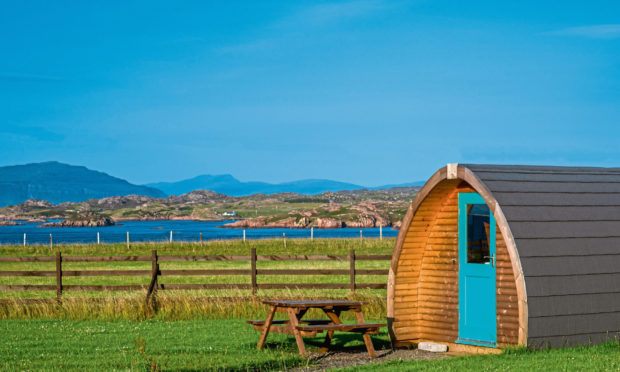Diversification has long been a watchword for Scottish agriculture, and a move to accommodation and tourism has enabled many farm businesses to strengthen their economic resilience as gate prices fluctuate.
For those who have made this leap, the pandemic has wrought a huge decline in tourism revenues and recent news that the public was being discouraged from booking an Easter getaway was a further knock for an already hard-pressed sector.
In recent months, there has been deep concern that further regulatory and financial burdens would be added on to what these businesses are already coping with as a result of a proposed new licensing regime for short-term lets.
Last week, the Scottish Government announced that it was withdrawing immediate legislative amendments to introduce a licensing scheme – but would pursue the measures if re-elected in May.
That would mean all local authorities having to open a licensing scheme by April 1 2022, and all existing hosts would have to have made an application for a licence by April 1 2023.
In recent weeks, Scottish Land & Estates (SLE), the Association of Scotland’s Self Caterers and Historic Houses Scotland have joined together to voice our worries about the proposals and we have met with MSPs from across the political spectrum as well as Scottish Government officials to put forward the views of our members.
We are pleased that the government has listened to the unease of rural businesses and, while there is a pledge to revisit the plans, a stakeholder group involving SLE and others is being formed to address issues and draft accompanying guidance before it comes back to Holyrood.
The government has said that health and safety of holiday accommodation is a key concern of the licensing system but its proposals went far beyond what was actually necessary, and its origins actually lie in a desire to tackle antisocial behaviour and a lack of available housing in primarily urban areas like Edinburgh.
The current proposals would see self-caterers and B&Bs, whose incomes are already suffering due to the impact of the pandemic, having to find funds for licence fees, annual “monitoring” fees plus potential planning fees if changes were required in order to obtain a licence.
One of our major contentions with the proposals so far was the lack of differentiation between distinct forms of accommodation, for example, tenements on the Royal Mile and glamping pods in rural Scotland.
For the purposes of the legislation, the two forms of accommodation would be treated similarly in many respects – despite being two completely different offerings.
This is something which the stakeholder group will seek to address in the guidance in the months ahead.
All forms of accommodation such as huts, wooden lodges, yurts and glamping pods that have done so much to support and help diversify Scotland’s rural economy, are almost certain to be included in these regulations so it is important that we look at the devil in the detail and request substantial changes to be made.
Agritourism has been estimated by GoRural to generate £100 million for Scottish agriculture per annum and has become a bedrock of the rural economy, sustaining many family farming businesses.
However, throughout the pandemic the sector has faced immense challenges. Forcing unwelcome and unnecessary regulations on small businesses will not tackle the root causes of these accommodation issues without impacting our important rural tourism sector.
Gavin Mowat is rural communities policy adviser at Scottish Land & Estates.
